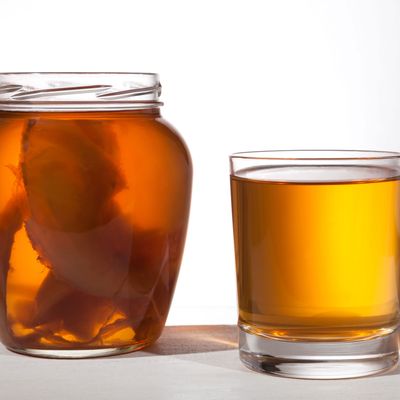
Whenever I’m running errands with friends, we’ll usually reach a point when we feel like we’re dying of thirst and need to stop by a bodega to pick up a drink. Without fail, I’ll grab some fruity drink that’s packed with sugar and sure to knock years off my life, while my friends will typically grab something they inform me is healthier, like a green juice or kombucha. I know why green juice is good for you, but I’m not sure why kombucha is considered a health drink. To learn more, I consulted two experts who explained that kombucha helps boost the immune system and might keep things moving in the gut.
How is kombucha made? In the most basic terms, kombucha is a fermented tea, made with tea leaves, sugar, yeast, and bacteria, and sometimes mushrooms, as well. It’s made by mixing those ingredients together and allowing them to ferment — and the end product contains a whole host of healthy components (such as Vitamin B and antioxidants) as well as a bit of alcohol (more on that later), registered dietitian and nutritionist Amy Shapiro of Real Nutrition NYC explained.
Why is it good for you? Well, kombucha is probably best known for containing probiotics, the beneficial strains of bacteria that can help create a level of homeostasis in a person’s gut. People often turn to probiotics when they’re on antibiotics (to try to maintain some good bacteria in their gut) or when they’re having gastrointestinal issues. However, Dr. Gail Hecht, chair of the American Gastroenterological Association Center for Gut Microbiome Research & Education, cautioned that there’s no scientific data that specifically looks at the effect of kombucha on digestion yet. But she told the Cut that many health benefits can be attributed to the beverage because of its probiotics.
On top of that, Shapiro added that the beverage may also have a ton of other healthy properties beyond probiotics. She explained that kombucha can help boost a person’s energy, because it contains caffeine and B vitamins and its iron improves oxygenation in the blood. It is also packed with antioxidants, which can help with a person’s immune system, and is believed to decrease joint pain. “It’s great for health preservation and recovery,” Shapiro added.
But what’s this about kombucha and alcohol? You may have read that kombucha contains alcohol — and that’s definitely true, though it usually doesn’t contain that much, according to Shapiro. The alcohol that’s contained in kombucha may be a result of the fermentation process, but it’s still sold as a health drink instead of an alcoholic beverage. That’s because kombucha usually contains less than 0.5 percent alcohol, which is the percentage of alcohol at which drinks need to be sold as alcoholic beverages. So you typically won’t have to whip out your ID if you’re buying it.
So how much should I drink? Since it’s a delicious fizzy drink, it may be tempting to chug kombucha like it’s water, but Shapiro says it’s usually a good idea to stick with only one of these drinks a day. “I recommend that everyone consume some sort of fermented food once a day,” she noted.
Who shouldn’t drink kombucha? First off, since kombucha contains alcohol, anyone who’s pregnant, taking medication, or trying to stay away from alcohol for whatever reason might want to abstain from the drink or consult with their doctor before drinking it. The alcohol means it may not be a good idea for children to drink as well, Shapiro noted. Additionally, as kombucha contains live microorganisms, anyone suffering from candida issues — fungal overgrowth in the body — should probably steer clear of the drink, too, according to Shapiro.
Which kombucha should I buy? Even though kombucha has been around for centuries, it’s currently on trend, so you can generally find it pretty much everywhere that sells healthy drinks. Shapiro recommends the Synergy or Health-Ade brands, but she also says that anything made locally is a good pick, as well.
This article previously referred to candida as bacterial overgrowth, instead of fungal. It has been corrected.


